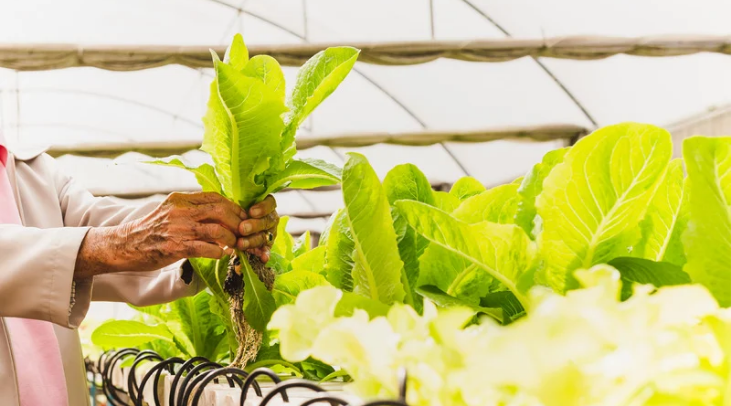With climate change and the rising global food demand, adopting sustainable farming practices has become increasingly essential. Hydroponic farming is one such practice that has attracted considerable interest due to its capacity to lessen environmental impacts while delivering high-quality produce. This soil-free cultivation method not only reduces water usage and land needs but also provides notable environmental advantages, particularly in the context of exporting goods worldwide. In this article, we will examine how hydroponic farming is reshaping agriculture, enhancing sustainability, and lowering environmental footprints within the global supply chain.
What is Hydroponic Farming?
Hydroponics refers to cultivating plants without soil. Instead of relying on traditional soil, plants grow with their roots immersed in nutrient-enriched water. This technique enables farmers to produce a range of crops—such as vegetables, herbs, and fruits—using advanced systems like nutrient film technique (NFT), deep water culture (DWC), or aeroponics. Hydroponic farming can take place in controlled indoor settings or areas with poor soil quality, allowing agriculture in regions where conventional methods are impractical.
1. **Water Conservation: A Major Advantage
One of the most notable environmental benefits of hydroponic farming is its effective water conservation. Traditional agriculture often depends heavily on irrigation, leading to excessive water consumption and depletion of local water supplies. Some estimates suggest that hydroponic farming can use up to 90% less water than conventional farming methods. This efficiency stems from hydroponics’ closed-loop system, which recycles water, minimizing waste and providing plants with exactly what they need for growth. In areas with limited water resources or high-demand export destinations, hydroponics represents a more efficient crop production method that conserves valuable water.
2. Reduced Land Use and Enhanced Space Efficiency
Beyond water conservation, hydroponics reduces the necessity for vast land areas. Traditional farming requires extensive plots for crop cultivation, often leading to deforestation and loss of biodiversity. Hydroponics can be used in urban environments, vertical farms, or greenhouses, taking up significantly less space. This capability allows the production of large food quantities in compact locations, such as city rooftops or repurposed industrial sites, alleviating pressure on land resources. Consequently, hydroponic farming can support the expanding global population without the environmental detriment of converting natural habitats into farmland.
3. Lower Carbon Footprint in Global Trade
Transportation significantly impacts the environmental footprint of exported goods. Shipping fresh produce over long distances generates considerable carbon emissions due to fuel consumption. Hydroponic farming, especially when implemented locally or nearer to export markets, can help diminish the carbon footprint associated with food exports. By cultivating crops in controlled environments close to consumption sites, long-distance transportation and its environmental costs are reduced. This localized strategy shortens supply chains, lowers emissions, and encourages the consumption of fresh, locally grown products.
4. Absence of Harmful Pesticides and Fertilizers
Traditional agriculture typically depends on chemical pesticides and synthetic fertilizers to sustain crop health and boost yields. These substances can negatively impact the environment by polluting water supplies, harming wildlife, and causing soil degradation. Conversely, hydroponic farming utilizes a more sustainable approach. As plants are grown in controlled settings, there is minimal need for harmful pesticides, and nutrient solutions can be precisely managed to meet plant requirements. This approach decreases pollution and ensures that crops are healthier and safer for consumers and the environment.
5. Promoting Sustainable Agriculture and the Circular Economy
Hydroponic farming naturally aligns with the concepts of a circular economy, where resources are used efficiently, and waste is diminished. The closed-loop water system ensures continuous recycling, and any leftover nutrients can be reintroduced, further reducing waste. Additionally, hydroponic operations can be powered by renewable energy sources like solar or wind, further lessening their environmental impact. By incorporating sustainable practices into food production, hydroponic farming fosters a more resilient and eco-friendly agricultural model for the future.
6. Enhancing Global Food Security and Export Potential
As the global demand for food rises and climate change affects traditional agriculture, hydroponics provides a viable solution to secure food availability in local and international markets. Hydroponic farms are less vulnerable to climate fluctuations, serving as a dependable food source, even in regions facing droughts or extreme weather. This reliability is especially crucial for exported goods going to countries dependent on food imports. Hydroponics can ensure a steady supply of fresh produce, reducing dependence on unstable international trade routes and bolstering the reliability of global food systems.
A Sustainable Future for Global Agriculture
Hydroponic farming presents an innovative and sustainable method for tackling the environmental challenges posed by traditional agriculture. By decreasing water consumption, reducing land requirements, and eliminating the necessity for harmful chemicals, hydroponics is paving the way toward an eco-friendlier future. For nations involved in exporting agricultural products, this method offers an opportunity to lessen the environmental impacts of global trade while ensuring a reliable, efficient supply of fresh produce. As hydroponic technology continues to advance, it has the potential to revolutionize our approach to growing, consuming, and exporting food, leading to a more sustainable agricultural framework for future generations.

